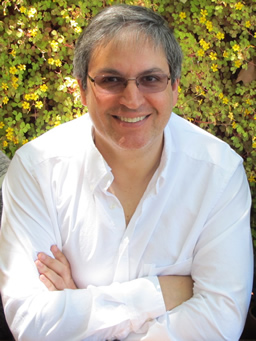The lead item this month is a brilliant
Bach recital by Berkeley-based David Cates. The performances resist falling
into any particular categories besides those of exceptional beauty, elegance,
and understated virtuosity.
- Laurence
Vittes, Southern California Early Music Society News, September 2000 |
|
|
David Cates (b. 1958) is an example of the outstanding talent to
be found in America’s newest generation of harpsichordists. A student
of Parmentier, he now makes his home in Berkeley, which is in many ways
the New Mecca for America’s period instrument movement. Cates’
recent Bach recital reveals an unusual interpreter at work (Wildboar 9902).
The CD concludes with what I consider the most successful rendition of
the difficult Chromatic Fantasy and Fugue ever recorded.
- Classical Music: The Listener’s
Companion (2002); from an overview of harpsichordists, and included in
a list of the 20 most highly recommended performers, both living and deceased. |
Bach; Music for Harpsichord, David Cates
Wildboar 9902
This disc
offers the best recording of the French Overture BWV 831 I’ve heard
to date. It just sounds ‘right’—grand in scale and yet
quite moving on a personal level. Cates’ style is deceptively simple
in that he pretty much lets the music perform itself. There’s no exaggerated
articulation, no pulling about of tempos, and no gimmicks. What there is
is real clarity, a fine sense of melodic line, and a kind of innocence about
it all that is a joy to hear and, quite frankly, a breath of fresh air compared
to many recordings. Along with the French Overture we also get some interesting
chorale settings, four intriguing, highly chromatic Duets BWV 802-5, and
the Toccatas in e minor and G major. Cates really finds the groove in these
last two works and, particularly in the G major Toccata, offers some thoughtful
and original interpretational points. The last piece on the disc, the d
minor Chromatic Fantasy and Fugue, is masterfully controlled, and Cates’
path through the harmonic minefield of the Fantasy is safe and true…….Few
harpsichordists are as unfussy, honest and revealing as Cates – this
is a disc to savour.
- Robin Bigwood,
Early Music Review (UK) |
This collection of Johann Sebastian
Bach’s keyboard music reflects the myriad influences that helped shape
his musical vision…..Cates’ choice of repertoire is eclectic….Cates’
technical prowess is daunting and when he gets to stretch out and show his
chops, this recording soars. The toccatas are ideally suited to Cates’
style; the final fugue in BWV 914 is a dazzler. Best of all is the grand
Chromatic Fantasy and Fugue in d minor BWV 903, where Cates spins a line
of notes at the conclusion of the opening Fantasy that will leave you breathless.
- Craig Zeichner,
Early Music America July 2000 |
David Cates’ 1998 Froberger
recital is a miracle of discovery for a composer who, despite past recordings
by Christophe Rousset, Lars-Ulrik Mortensen and Gustav Leonhart is not
quite yet in the mainstream of early music –but ought to be…….Cates
presents a profoundly sensitive and moving concert.
- Laurence
Vittes, SCEMS May 2000 |
Two new Bach programs
from young, imaginative artists; I’ve heard Cates before, in an engaging
Froberger program (Sept/Oct 1998). His Bach has the same variety of playing
style and interpretive surprise. One of the most enjoyable shocks of all
is the way he begins the G major Toccata. For those who know the music,
the work begins with a single melodic line, echoing Vivaldi’s most
exuberant manner, that we hear twice before the piece proper begins. Cates
does something I’ve never heard: he puts a big silence in before the
second playing, making the first seem like a false start. This good-humoured
touch is perfect for one of Bach’s earliest and most enthusiastic
works. At other times Cates is more understated. In the French Overture,
for instance, he conveys a lot of expressive character with the most economical
of gestures; a halting of the tempo in one spot, a single bass passage played
with all the notes detached. The whole adds up to a conception of the French
Overture that is more personal than most of the current ones.
- Rob Haskins,
American Record Guide, Sept/Oct 2000 |
 |
![]()
![]()